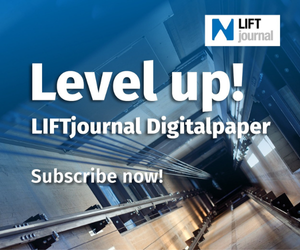Digital production: more than a fad
VW boss Herbert Diess predicted the group would turn towards software at the IAA. This forecast will also affect mechanical engineering – and as a result the lift sector.
A few weeks ago, the International Motor Show Germany (IAA) in Munich ended. And in the midst of all the fireworks of the numerous technical innovations, a revolutionary statement by the VW Chairman of the Board of Management, Herbert Diess, was almost overlooked. "The current business with combustion motors is actually no longer priced in, but only its future viability," said the top manager.
Currently, the focus of the stock market experts was on the question whether they were competitive and profitable when it came to electrical vehicles. But the company was apparently on the verge of an even more fundamental change, "In the next dimension, we will look into whether we are capable of making a software-based product. That’s the next big question we need to answer.""
Herbert Diess was talking about the distant future. But he also knows that the change he probably discovered with a telescope arrived long ago. Competitor Tesla, which has been making short work of VW for years, is one of the most impressive examples of this.
Duped ex-champion
Elon Musk has demonstrated that in the digitalisation era, products and services can be rethought and completely reformulated from the software side – with the pleasant side effect of then being in a position to redefine the rules for the entire sector.
VW’s previous engineering excellence in engines, suspension, body and transmission pale into insignificance in the face of the new world. Hence, the now loudly trumpeted change in direction of the carmaker is nothing other than the desperate manoeuvre of a duped ex-champion.
Eve of a revolution
But these developments will not stop short of the lift industry either. Lift manufacturers can admittedly consider themselves fortunate that digitalisation has not yet really had an impact on the sector. But we are clearly on the eve of a revolution. And as tends to be the case with revolutions, the result of the upheaval cannot be precisely forecast. What is clear is that one stone will not remain on top of another; in the end there will be winners and losers.
Sebastian Borek shares this view. The founder of the SME digitalisation Founders Foundation in Bielefeld is convinced that digitalisation will not stop short of any business model. "One may not be able to imagine it at the moment, but the change will occur at exponential speed. Purely in biochemical terms, this exceeds what people can imagine," according to the SME expert.
Mental transformation
Borek has often enough seen digitalisation dismissed as a passing fad. "People have full order books, they live in their cocoon and right here and now everything is fine." But because added value is now moving in the direction of software, completely new competitors were suddenly butting into the market. "And to be precise, ones people had not reckoned with earlier, because they're not those they'd met in the past at the trade fair."
Borek regards the current digitalisation push primarily as "an entrepreneurial transformation that first had to occur mentally. Many entrepreneurs recruit experts for this subject, but at the end of the day, it’s up to the boss."
What new business models will become possible due to digitalisation in the lift sector and where the first early signs are already detectable is something I will describe in the next issue of the LIFTjournal.
An analysis by Dr Lars Watermann
The author is managing director of Watermann Agens GmbH and specialised in company transaction in the lift sector. He has advised numerous lift entrepreneurs on selling their companies in the last 15 years, including Marohn, Colonia and the Eggert Group (TK Elevator), Janzhoff (Kone), B&T, Dralle and – currently – A.S. Aufzug + Service (Schindler).






















Write a comment